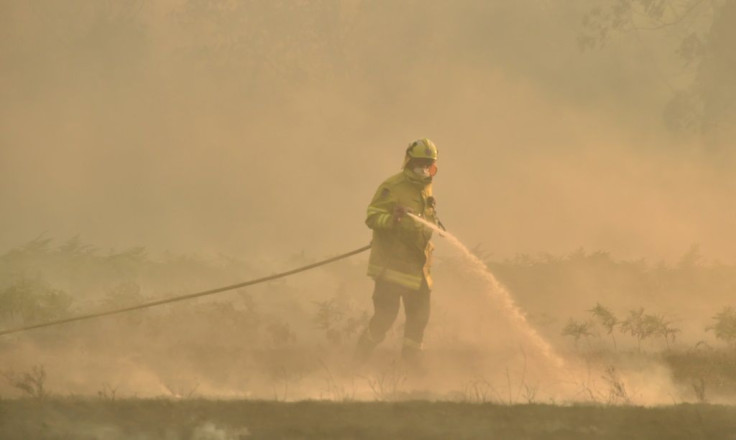Australia Bushfires: Too Early To Estimate Losses From Latest Climate Change Disaster, Warnings Of Catastrophic Danger

Australia is enduring a bushfire crisis that has left at least four people dead and prompted warnings of catastrophic danger. However, it is unclear if damages and losses from this bushfire will be as great as those incurred in the 2009 fires.
Munich Reinsurance Co. reported bushfires represent one of the biggest causes of loss due to natural phenomena in the southern half of Australia.
In 2009, a massive bushfire -- called Black Saturday -- burned 4,500 square kilometers, killed 173 people and destroyed about 2,000 homes. The total insured property loss from that disaster was about $1.2 billion in Australian dollars ($800 million in U.S. dollars).
Marcel Thieliant, senior Australia & New Zealand economist at Capital Economics, told IB Times that Black Saturday was the most devastating bushfire in Australia to date. But he noted the latest fires have already destroyed about 11,000 square kilometers in New South Wales alone. That suggests the damage could be even greater than the 2009 inferno, he said.
“If we assume that the damage to lives and property rose proportionally relative to the area destroyed, that would result in damage of around $3 billlon ($2 billion US), or 0.15% of [gross domestic product],” Theliant added.
Mehmet Ulubasoglu, professor of economics at Deakin University, and lead researcher at the Bushfire and Natural Hazards Cooperative Research Centre, said the 2009 bushfire catastrophe also led to untold intangible damages,
“Not only were many residents forced to live in temporary accommodations for up to two years, but also several communities had to be provided with social and infrastructure support by the state government of Victoria; a significant burden on the economy,” he said. “Besides fatalities and injuries, the adverse impacts of Black Saturday regarding mental health, family violence, and alcohol consumption are well-documented.
But for 2019, Eberhard Faust, head of research, climate risks and natural hazards at Munich Re, said, “It is much too early for loss estimates as the fire season is still developing.”
Bushfires Background
Geoscience Australia, an agency of the government, explained bushfires are an “intrinsic part” of Australia's environment.
Between 1967 and 2013, major Australian bushfires caused 8,000 injuries and 433 fatalities, nearly half of all deaths from major Australian natural disasters in the period. Over that same period, bushfires created losses of about $4.7 billion ($3.14 billion U.S.).
The Australian government’s Bureau of Meteorology recently released a report on climate that offered some stark data. Among other things, it said “heat events” are increasing in frequency or intensity. In addition, the report indicated Australia's climate has warmed by more than over 1°C since 1910 while sea levels are rising around the huge island.
Australia’s Climate Council, a nonprofit organization, warned in a 2014 report that climate change is exacerbating the frequency and severity of such fires. “Climate change is making hot days hotter, and heatwaves longer and more frequent. Some parts of Australia are becoming drier,” said the report.
Dr. Richard Thornton, CEO of the Bushfire and Natural Hazards Cooperative Research Centre, told IB Times: “Unfortunately we knew, along with the fire services, that this fire season had the potential to be devastating.”
Thornton added firefighters in New South Wales and Queensland have been battling severe bushfires since early September, and there’s a lot of time left in this fire season.
“This fire season is influenced by the warm and dry conditions we’ve been experiencing all year,” he said. “In southeast Queensland and northern New South Wales, the last three years have been dry and warm – it is these conditions that are driving the severity of the current bushfires.”
Climate Change To Blame?
Australian National University climate scientist Imran Ahmed said there is a “clear linkage” between climate change and these bushfires.
“Climate change exacerbates the conditions in which extreme weather events like bushfires happen,” he said.
Faust of Munich Re said that over the past few decades man-made climate change has “substantially driven up the risk” of extreme heat events, drought and bushfires in many regions of Australia, particularly in regions in the south and the east of Australia.
But Thornton cautioned that heat, drought, flood and fire are not new phenomena for Australia.
“What is different now is that there is an underlying 1 ℃ increase in average temperatures since industrial times began -- the result of climate change -- which means that the variability of normal events sits on top of that. So climate change alone doesn’t create a bad fire season, but can make the weather conditions conducive to very large and destructive fires,” Thornton said.
Weather records, he noted, are routinely being broken and all indications are that temperatures will continue to increase.
“We cannot be sure what this means for extreme hazards like bushfires,” he said. “This is an area in critical need of further research into weather prediction, land planning, infrastructure development, population trends and community awareness.”
Government Impact
Ahmed said that while the science surrounding the role of climate change is “pretty clear”, it is unfortunate that this is not accepted by some players, including some top government officials, including Deputy Prime Minister Michael McCormack, who described climate change activists as “pure, enlightened and woke capital-city greenies” and “raving lunatics.”
Under terms of the Paris Agreement, Australia, the world’s biggest exporter of coal, has pledged to cut its target its emissions by 26% to 28% below 2005 levels by 2030.
But some observers think that it not enough. Australia, as a Group of 20 country, has the potential and the resources to do much more on reducing greenhouse gas emissions, Ahmed added.
© Copyright IBTimes 2024. All rights reserved.





















